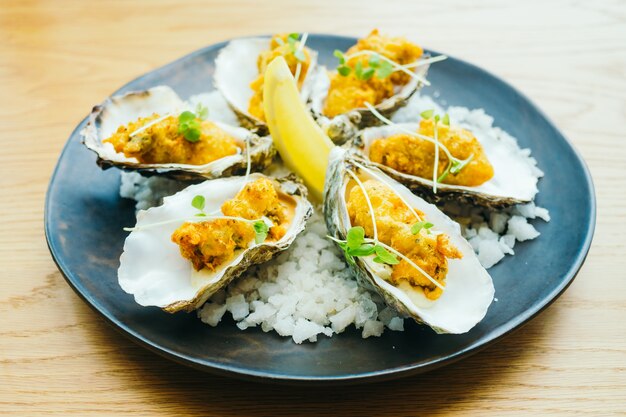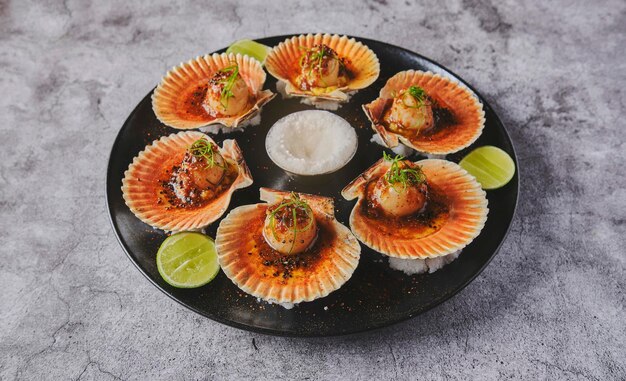Scallops are a popular seafood choice, prized for their delicate flavor and versatility in cooking. These small, tender mollusks are not just delicious; they pack a significant nutritional punch. But how healthy are scallops, really? This article explores the nutritional profile, health benefits, and potential risks of consuming scallops to help you make an informed decision.
Nutritional Profile of Scallops
Scallops boast an impressive nutritional profile, making them a valuable addition to a balanced diet. Let’s dive into their macronutrient composition, vitamins, minerals, and beneficial fats.
Macronutrient Composition
Scallops are low in calories yet rich in essential nutrients.
- High-Quality Protein Content
Scallops are an excellent source of lean protein. A 3-ounce serving contains about 20 grams of protein, helping to build and repair tissues. - Low in Fats and Carbohydrates
With less than 1 gram of fat and negligible carbohydrates per serving, scallops are ideal for those watching their calorie intake or following low-carb diets.
Vitamins and Minerals
Scallops are nutrient-dense, offering several vital vitamins and minerals.
- Vitamin B12
Scallops are rich in Vitamin B12, essential for red blood cell production and neurological health. - Magnesium and Potassium
Both minerals are vital for maintaining proper muscle function and regulating blood pressure.
Omega-3 Fatty Acids
Scallops provide omega-3 fatty acids, which support heart and brain health. These essential fats help reduce inflammation and lower the risk of chronic diseases.
Related to Read: Seafood Stuffing Recipe
Health Benefits of Eating Scallops
Incorporating scallops into your diet can lead to numerous health benefits, thanks to their rich nutrient content.

Supports Heart Health
Scallops contribute significantly to cardiovascular well-being.
- Omega-3 Fatty Acids
These healthy fats reduce bad cholesterol levels and decrease the risk of heart disease. - Magnesium and Potassium
These minerals help maintain healthy blood pressure levels and promote overall heart function.
Aids in Weight Management
Scallops are perfect for those seeking weight control or muscle maintenance.
- Lean Protein
The high protein content in scallops promotes a feeling of fullness, curbing unnecessary snacking. Additionally, protein supports muscle growth and repair, aiding in weight management.
Enhances Cognitive Function
The nutrients in scallops play a role in keeping your brain sharp.
- Vitamin B12
This vitamin is crucial for brain health. It supports nerve function and may reduce the risk of cognitive decline with age.
Provides Antioxidant Protection
Scallops contain antioxidants that fight oxidative stress.
- Cellular Damage Prevention
Antioxidants protect cells from free radicals, potentially reducing the risk of chronic diseases like cancer.
Potential Risks and Considerations
While scallops are packed with nutrients, there are a few risks to be aware of when consuming them.
Allergic Reactions
Shellfish allergies are common and can lead to severe symptoms.
- Symptoms to Watch For
These include itching, swelling, difficulty breathing, and, in severe cases, anaphylaxis. Anyone with a known shellfish allergy should avoid scallops.
Purine Content
Purines in scallops can be problematic for some individuals.
- Risk for Gout and Kidney Stones
Purines break down into uric acid, which may trigger gout attacks or kidney stone formation in susceptible individuals.
Heavy Metal Contamination
Scallops can contain trace amounts of heavy metals like mercury and cadmium.
- Importance of Sourcing
Opt for scallops sourced from reputable suppliers to minimize exposure to these harmful substances.
Diarrhetic Shellfish Poisoning
Consuming scallops from contaminated waters poses health risks.
- Proper Sourcing Matters
Always ensure scallops are harvested from safe and regulated waters to avoid toxins How to Select and Prepare Scallops: A Comprehensive Guide
Scallops are a delicious and nutritious seafood choice that can elevate any meal. To fully enjoy their health benefits, it’s important to know how to select, store, and prepare them properly. This guide provides practical tips on purchasing, handling, and cooking scallops, compares them with other seafood, and discusses their role in a balanced diet.
Related to Read: Are Mushrooms Healthy?
How to Select and Prepare Scallops
Scallops are a delicious and nutritious seafood choice that can elevate any meal. To fully enjoy their health benefits, it’s important to know how to select, store, and prepare them properly. This guide provides practical tips on purchasing, handling, and cooking scallops, compares them with other seafood, and discusses their role in a balanced diet.
Purchasing Tips
Selecting fresh, high-quality scallops is the first step to enjoying their taste and nutritional benefits.
- Choosing Fresh Scallops
Look for scallops with a firm texture and a mild, fresh ocean scent. Avoid scallops with a fishy or sour odor, as this indicates spoilage. Fresh scallops are typically off-white or slightly pink in color, with no signs of browning. - Opting for Dry-Packed Scallops
Choose dry-packed scallops over wet-packed ones. Dry-packed scallops are untreated and retain their natural flavor and texture, while wet-packed scallops are soaked in a solution that can affect their taste.
Storage Guidelines
Proper storage ensures scallops remain fresh and safe to eat.
- Refrigeration
Store fresh scallops in the refrigerator at a temperature below 40°F (4°C). Place them in an airtight container on a bed of ice to keep them cool. Use them within 1-2 days of purchase. - Freezing
If you’re not cooking them right away, freeze scallops in a vacuum-sealed bag or airtight container. Frozen scallops can be stored for up to three months. Thaw them in the refrigerator overnight before use.
Preparation Methods
Healthy cooking techniques bring out the best in scallops while preserving their nutritional value.
- Healthy Cooking Techniques
Steaming, grilling, and baking are excellent methods to cook scallops without adding unnecessary fats. These techniques retain their natural sweetness and delicate texture. - Limit Heavy Ingredients
Avoid using excessive butter, cream, or oil. Instead, season scallops with herbs, lemon juice, or a light drizzle of olive oil for a healthier option. - Quick Cooking
Scallops cook quickly, usually in 2-3 minutes per side. Overcooking can make them rubbery and less enjoyable.
Comparisons with Other Seafood
How do scallops stack up against other popular seafood choices? Let’s compare.

Scallops vs. Shrimp
- Nutritional Profile
Both scallops and shrimp are low in calories and high in protein. However, scallops contain more omega-3 fatty acids, which support heart health, while shrimp have slightly higher cholesterol levels. - Culinary Versatility
Both are versatile in recipes, but scallops offer a sweeter, more delicate flavor compared to the savory taste of shrimp.
Scallops vs. Oysters
- Health Benefits
Oysters are richer in zinc, which supports immune function, while scallops provide more magnesium and potassium for heart health. Both are excellent sources of vitamin B12. - Flavor and Texture
Scallops have a firmer texture and a sweeter taste, while oysters are softer with a brinier flavor.
Incorporating Scallops into a Balanced Diet
Scallops can be a valuable part of a healthy diet when eaten in moderation and paired with nutritious sides.
Serving Sizes and Frequency
- Portion Recommendations
A 3-ounce serving of scallops is sufficient for most people. This provides around 100 calories and 20 grams of protein. - Frequency
It’s safe to consume scallops 1-2 times per week as part of a varied seafood intake.
Complementary Foods
- Balanced Pairings
Pair scallops with fiber-rich vegetables like asparagus, broccoli, or spinach. Add a serving of whole grains like quinoa, brown rice, or farro for a complete meal. - Healthy Sauces
Use light sauces made from lemon, garlic, or olive oil to enhance their flavor without adding excessive calories.
Conclusion
Scallops are a nutrient-packed seafood option with numerous health benefits. Their high-quality protein, omega-3 fatty acids, and essential vitamins make them a great addition to a balanced diet. By selecting fresh scallops, storing them correctly, and using healthy cooking methods, you can maximize their flavor and nutritional value. Enjoy scallops in moderation alongside other healthy foods to support your overall well-being.
FAQs
1. How can I tell if scallops are fresh?
Fresh scallops have a mild ocean scent and a firm, moist texture. Avoid scallops with a strong fishy odor, discoloration, or sliminess.
2. Are frozen scallops as nutritious as fresh ones?
Yes, frozen scallops retain most of their nutritional value if properly frozen. They are a convenient option when fresh scallops are not available.
3. Can scallops be part of a weight-loss diet?
Absolutely. Scallops are low in calories and high in lean protein, which can help you feel full and support muscle maintenance during weight loss.
4. What’s the best way to thaw frozen scallops?
Thaw frozen scallops in the refrigerator overnight. For quicker thawing, place them in a sealed plastic bag and submerge them in cold water.
5. How do scallops compare to other seafood in terms of sustainability?
Scallops are generally considered a sustainable seafood choice, especially when sourced from responsibly managed fisheries. Look for certifications like MSC (Marine Stewardship Council) when purchasing.

